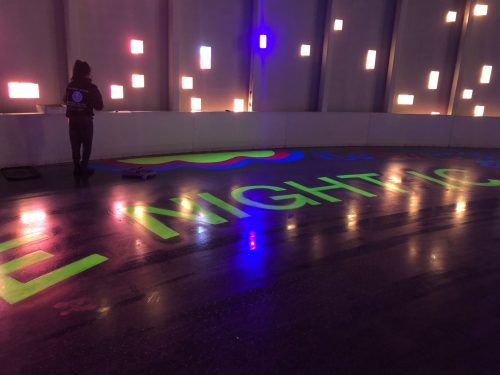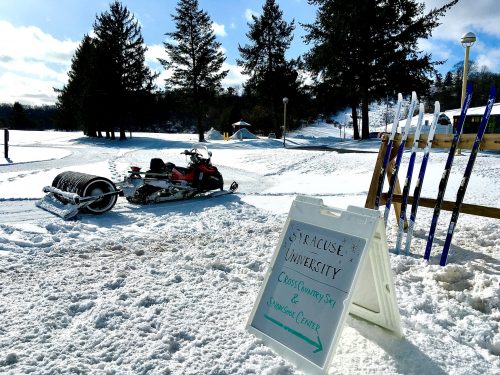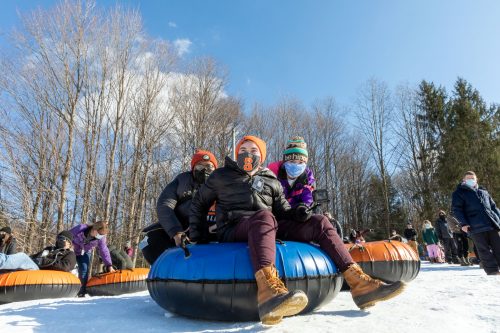Winter is upon us! Sadly, the warm name of ‘spring semester’ does not translate to the weather in snowy Syracuse, but there is still fun to be had during these darkest of days. From Late Night Ice sports at Tennity Ice Skating Pavilion to scaling walls of ice with the Syracuse University Outing Club, adventure at Syracuse University has no minimum temperature.
Late Night Ice at Tennity Link
Tennity Ice Skating Pavilion offers not one, but TWO exciting activities for the late-night crowd. After sundown every Thursday through Saturday, Tennity hosts “Late Night Ice” with blacklight curling on Thursdays and glow skate on Fridays and Saturdays. Late night ice skating is always available on the main rink. Admission and rentals are free for students, and reservations are required through the Wellness Portal.

Cross Country Skiing and Snowshoeing Link
It can be difficult to find activities besides Netflix to fill your days during these COVID times, so why not get outside and trek across the gentle slopes of a golf course? The Cross Country Ski and Snowshoe Center at Drumlins Country Club offers cross-country skiing and snowshoeing every Friday, Saturday and Sunday for free. Wellness Portal reservations are required.
Bonus: there are Centro buses that run from Drumlins to College Place, making transportation free and easy if you choose not to take advantage of free transportation on select dates.

Syracuse University Outing Club Winter Sports Link
If you frequent the climbing wall at the Barnes Center or love to hit the slopes over break, consider taking a trip with SUOC, the Syracuse University Outing Club. Since 1935, the student-run club has been a meeting place for those who love adventure and the outdoors. In the colder months, they offer cross-country and downhill/backcountry skiing, winter hikes and ice-climbing. Learn more about SUOC on their ’Cuse Activities webpage.
SUOC meets on Tuesdays at 7:30 p.m., over Zoom, and trip information is available on their website. The first trip is free and membership is open to both Syracuse University and SUNY-ESF students!

Cool Science at the MOST Link
Want to feel the excitement of the night before a field trip again? Plan out your outfit this weekend for a visit to the Milton J. Rubenstein Museum of Science and Technology (MOST) downtown. Located in Armory Square, the MOST hosts interactive exhibits about anything and everything science. While the pandemic has closed their IMAX theater and planetarium, the MOST has opened five new exhibits for you to explore instead. These additions include a new projecting gaming system called Beam and the return of their popular DaVinci installation. Tickets are $12 for adults, and the MOST is open Fridays, Saturdays and Sundays from 9:30 a.m. to 1 p.m., and 2 p.m. to 5:30 p.m. Reserve your tickets, today!
Tubing at Four Seasons Ski & Golf Link
If strapping a pair of slippery planks to your feet —aka skiing— sounds like your worst nightmare, go for the less daring, but equally fun option of tubing! Four Seasons has you covered. A day of tubing costs $26, rentals included, and you can spend your day outside, shredding the slopes, without the threat of knee injury. Tubing at Four Seasons is open Monday through Friday from 10 a.m. to 5 p.m., and Friday and Saturday from 10 a.m. to 9 p.m.

Delicious Food at the Salt City Market Link
If you have a longer break between classes midday, why not travel 10 minutes downtown and have lunch at the Salt City Market? The Salt City Market is open at 25 percent indoor dining capacity for now and has been operating with the utmost care for the health and safety of the community.
As always, make sure to conduct yourself within the guidelines of the Stay Safe Pledge. Remember your gloves, hat and mask, and go have fun!
Written by Cecelia Kersten ’23, S.I. Newhouse School of Public Communication




